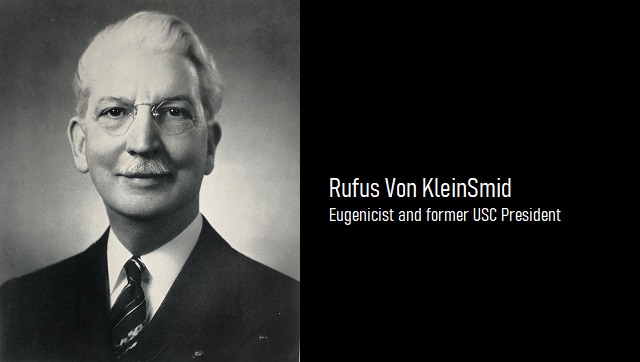Memories of eugenics president erased from USC campus

‘Those who cannot remember the past are condemned to repeat it.’ Well, maybe.
The past week has seen statues and monuments whose subjects were linked to racism defaced or destroyed in the UK, UK and Australia. The memory cleansing movement also reached the University of Southern California (USC), with a slightly different twist.
The USC President, Carol Folt, swiftly removed the name and bust of her one of her predecessors, Rufus Von KleinSmid, from a prominent historic building on the campus. She was responding to years of agitation to expunge memorials to Von KleinSmid.
In his day, Von KleinSmid was a prominent figure in the United States. He began his career as a professor of education and psychology. In 1914 he became president of the University of Arizona, and moved from there to USC in 1921. He was president of USC for 25 years until 1947.
On his watch, USC experienced a huge expansion and slowly became the major university that it is today. Von KleinSmid was awarded a National Institute of Social Sciences Gold Medal in 1942 and was honoured by 20 national governments for his achievements.
Unfortunately, USC’s president was also an ardent eugenicist. He co-founded the Human Betterment Foundation in 1928, a Pasadena-based think-tank which promoted compulsory sterilization for the improvement of the species. Dr Folt described him as “an active supporter of eugenics [whose] writings on the subject are at direct odds with USC’s multicultural community and our mission of diversity and inclusion.”
There’s no doubt that Von KleinSmid’s views are not acceptable in polite company nowadays. A brief glance at a pamphlet which he wrote in 1913 yields such gems as:
We must all agree that those who, in the nature of the case, can do little else than pass on to their offsprings the defects which make themselves burdens to society, have no ethical right to parenthood. To deny them this privilege is, in the language of John Harris, “no infringement of liberty, it is a curtailment of unbridled license which is a disgrace to our civilization (?) and to our vaunted Christianity. ”
Or
The average worth of the individual to society is constantly lowered because of both the lack of productiveness among the worthy, and the fecundity of the defective. There can be no question of the outcome of the tragedy when society must depend finally upon an average ability too feeble to stand upon its own feet. It is estimated that one million of our population are incarcerated in public institutions, while three times that many, through their own incapability, pull a dead weight against society’s progress.
So there’s no point in denying that Von KleinSmid was a eugenicist, although he could argue in his defense that progressive American intellectuals before World War II shared his views — people like birth control activist Margaret Sanger, African-American rights activist W. E. B. Du Bois, inventor Alexander Graham Bell, botanist Luther Burbank, President Theodore Roosevelt, Supreme Court justice Oliver Wendell Holmes Jr and others too numerous to list here.
This is just a small incident in the wider movement to purge the US of racism. But it raises a few questions. Von KleinSmid’s sentiments are echoed every day by gynaecologists advising pregnant mothers to abort their Down syndrome child. In fact, a discrete investigation at the USC Keck School of Medicine might be in order if the university wants to purge itself of eugenics.
Isn’t it better to ask how eugenics has evolved rather than to expunge it from the public record? And damnatio memoriae (the Roman habit of rubbing out inscriptions and beheading statues) seems an odd way to obliterate interest in eugenics, which actually seems to be growing by leaps and bounds.
As we all have heard many times, “Those who cannot remember the past are condemned to repeat it”.
Interestingly, this is the best-known maxim of the Spanish-American philosopher, novelist and Harvard professor George Santayana – who was — yes, you guessed it — a eugenicist! “Some races are obviously superior to others,” he wrote in his highly praised five-volume 1906 book The Life of Reason. It figures: all that remembering stuff corrupts the soul.
So what do we do now?
Here’s a suggestion. Forget it; forget everything. Just make it up as we go along. That way, when we do end up repeating the atrocities of the past, no one will notice.
Michael Cook
Michael Cook is the editor of MercatorNet More by Michael Cook
EDITORS NOTE: This MercatorNet column is republished with permission. ©All rights reserved.


Leave a Reply
Want to join the discussion?Feel free to contribute!